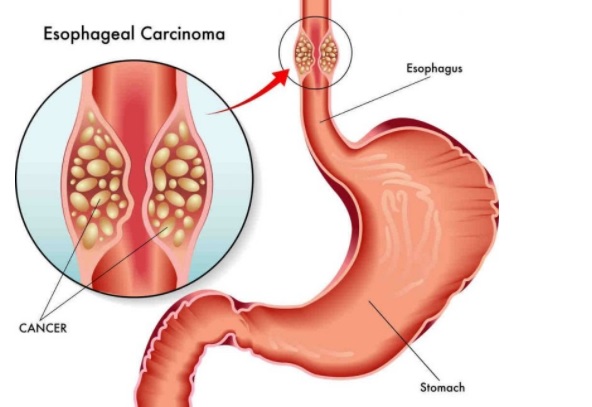What is Esophageal Cancer?
- Esophageal cancer is a tumor that forms in the tissue lining the esophagus, the muscular tube through which food passes from the throat to the stomach.
- Difficulty in swallowing (dysphagia), weight loss, hiccups, or food coming back up the esophagus may be symptoms of esophageal cancer
What are the Symptoms of Esophageal Cancer?
Most people with esophageal cancer show symptoms from an advanced stage, and unfortunately not often during early stages. Some common symptoms include:
-
Difficulty swallowing
-
Chest pain
-
Unintended weight loss
-
Hoarse voice
-
Chronic cough
-
Black stool
-
Vomiting
-
Bone pain
-
Bleeding into the esophagus
-
Anemia
-
Fatigue
Contact our office today if you believe you may be at risk and/or are experiencing some of the symptoms listed above. Our team of doctors will determine the course of treatment that is best suited for you.

What are the Risk Factors for Esophageal Cancer?
-
Some risk factors for esophageal cancer have been identified.
-
Gender: Men are more likely to develop esophageal cancer than women.
-
Tobacco use: The use of tobacco is a major risk factor. Smoking as well as smokeless tobacco such as chewing tobacco increases the risk of esophageal cancer. Smokers have an increased risk of adenocarcinoma.
-
Alcohol Consumption
-
Gastroesophageal reflux disease (GERD)
-
Barrett's Esophagus
-
Overweight/Obesity
-
Age: The risk increases with age and fewer than 15% of cases are found in people under the age of 55.
What is the Treatment for Esophageal Cancer?
- Surgery
- Adjuvant therapy
- Chemotherapy
- Radiotherapy
- Targeted Therapy
At HEMATOLOGY & ONCOLOGY CARE we customize your care so you can receive the most advanced, least invasive treatment possible. Planning of the treatment involves an interdisciplinary team of medical professionals. This usually implies a meeting of different specialists we have at HOC.


